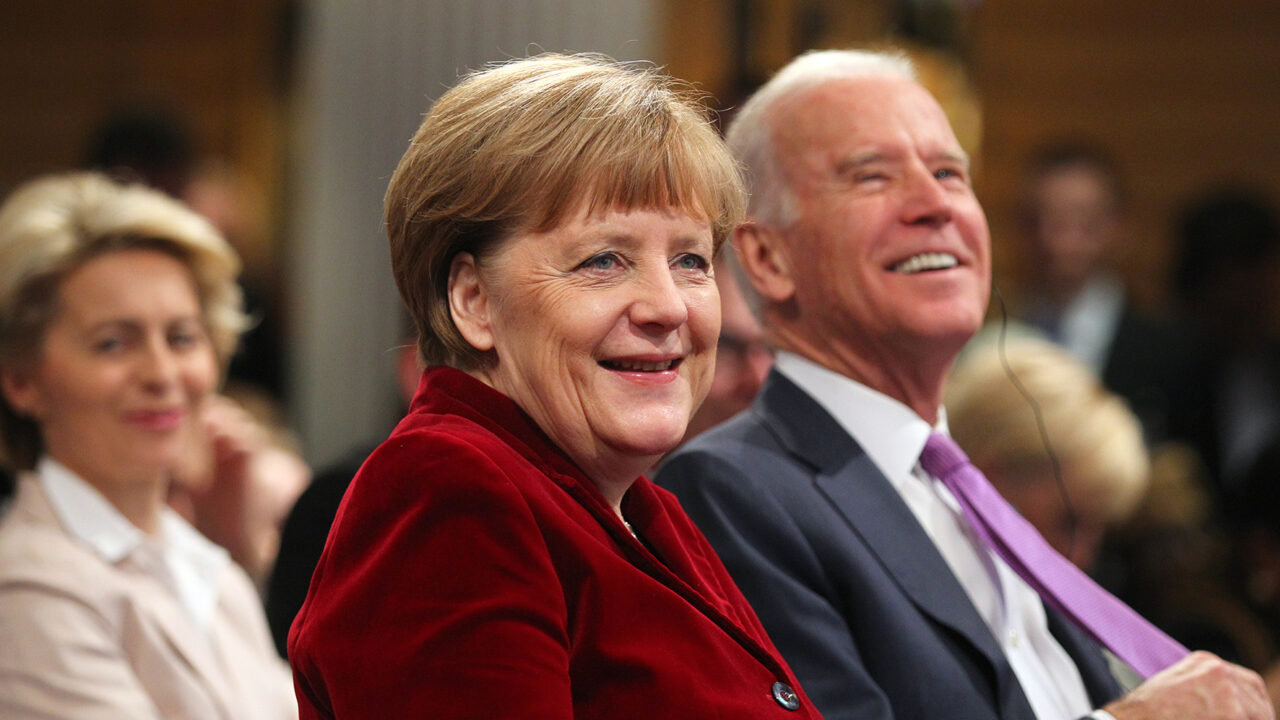A dangerous ambiguity: Why Germany is lukewarm about Biden’s America
Berlin will only harm itself and others if it continues to snub Washington’s entreaties to rebuild the transatlantic alliance
Angela Merkel is on a farewell tour. This week she arrived in Washington for an official working visit with Joe Biden. But the trip is, at heart, about Merkel’s legacy and the future of German-American relations.
When Donald Trump was voted out of office last November, Europe breathed a deep sigh of relief. The roller-coaster in transatlantic relations had ended, with the new incumbent eager to regain trust, repeatedly reassuring maltreated allies that “America is back”. The United States has returned to the Paris climate agreement, sings the praises of multilateralism, and continues to call for the strengthening of liberal democracies against authoritarian temptations at home and abroad.
The US also launched a special charm offensive towards Germany, which Trump had notoriously criticised as a freeloader. Immediately after taking office, Biden froze Trump’s decision to withdraw thousands of troops from Germany after a decades-long presence, announcing instead an increase of 500 troops. On defence spending, he joins the choir of his predecessors demanding that Germany do more. But Biden’s aim is not to punish Germany but to win it back as a partner. In the long-running dispute over the German-Russian Nord Stream 2 gas pipeline, secretary of state Antony Blinken declared that waiving sanctions was in “the national interest of the United States.”
The Biden team knows very well that it depends on strong partners for its project of renewing the West. It knows too that the US cannot do without the Europeans, above all the Germans, in its competition with China, which will likely take place in the areas of trade and technology. The administration is keenly aware that the window of opportunity to renew transatlantic relations is relatively narrow, and that it needs European help to relieve it abroad and support it in its struggle for democracy at home. This constellation opens up room for manoeuvre that all Europeans, but especially the Germans, should use in their own best interest.
But how is Berlin reacting? Hesitantly. The loss of trust during the Trump years runs deep. Quite obviously, no one distrusts Biden, whose biography speaks for itself. The hesitation rather stems from concerns about the future of the US as a deeply divided country and an increasingly fragile democracy. The headline of one commentary captures it well: “Biden is back, but America isn’t.” To be sure, there is no shortage of declarations of willingness to open a new chapter in transatlantic relations and to work together to overcome the big challenges of our time. But the record after the first half-year is decidedly mixed.
A new beginning in transatlantic relations cannot be accomplished with one foot on the brake.
Certainly, there has been some progress. There is much enthusiasm from both sides for deeper cooperation on climate and a new push to revitalise the Iran negotiations. And there have been positive outcomes such as: joint sanctions issued against Chinese officials; the recent agreement on the Airbus-Boeing dispute (which, at 17 years, outdates even Merkel’s time in office); and the creation of a transatlantic Trade and Technology Council. However, there is also an opposing trend.
Just before Biden’s inauguration in January, the EU, with Merkel as its driving force, rushed to conclude an investment agreement with China, to the disappointment of the Biden team, which had hoped to coordinate on the issue. Against Merkel’s will, the European Parliament has now put the deal on ice. In February, final construction work resumed on Nord Stream 2, the project that continues to cost Germany a considerable amount of political capital, especially in eastern Europe and the US, and whose benefits are not apparent compared to this high political price. German and American negotiators began to talk in late spring about how a compromise could look, but an agreement could not even be presented before Merkel left for Washington.
Shortly after Biden’s meeting with Vladimir Putin in Switzerland in May, Merkel and Emmanuel Macron surprised everyone by announcing they would convene an EU-Putin summit, to the sheer horror of Balts and Poles. Merkel made sufficiently clear that this initiative was intended as a rival event to the Biden-Putin meeting and stemmed from a certain European thirst for prestige. If the US president was right to talk with Putin, then Europeans should do the same in order to defend their own interests. She added: “We should not simply be informed about the US president’s talks.”
Shortly thereafter, Merkel and Macron met with Xi Jinping via video link – the second meeting this year to discuss how to advance the China-Europe investment agreement. Merkel also wanted to reassure Xi that cooperation with China would continue, on the one hand to minimise the chances of a confrontation and on the other to avoid jeopardising German economic interests. In doing so, she also sent a signal to Washington, whose confrontational style towards China she suspects of promoting a “new cold war.”
In May 2017 she announced in a Munich beer tent: “We Europeans really must take our fate into our own hands.” The days of being able to rely completely on others were “a bit over.” Many believed that this statement marked less a change than an expression of her frustration with the recent failed G7 summit with a destructive Trump. In retrospect, this appears to be a misinterpretation.
To be clear, it is by no means impossible that Trump or his doppelganger will win in 2024. And, of course, Europeans must prepare for such an outcome. They will need to take more of their own security and prosperity into their own hands – irrespective of who occupies the White House. But spurning the opportunity offered by the Biden administration is negligent and could quickly become a self-fulfilling prophecy. A new beginning in transatlantic relations cannot be accomplished with one foot on the brake.
Moreover, fears of being pushed by the US into a confrontation with China should not obscure the fact that China itself has very clear ideas about what Europe’s place should be in a largely Chinese-dominated order. The European quest for “strategic sovereignty” suits China just fine. It sees it as an effective tool to divide Europeans and Americans and stymie Biden’s plans for a grand alliance among democracies pursuing a common strategy on China. Merkel’s “geostrategic ambiguity” – as foreign policy expert Ulrich Speck calls it – could quickly lead to geostrategic sidelining. The polls suggest a new conservative-green government will come to power this September, with Armin Laschet as chancellor and Annalena Baerbock as foreign minister. In this scenario, Merkel’s legacy will find its guardian in Laschet, but an outspoken critic in Baerbock. Such a post-Merkel coalition government will need to realign German foreign policy at a time when Europe and the US are looking for a strong, reliable German partner.
The European Council on Foreign Relations does not take collective positions. ECFR publications only represent the views of their individual authors.



